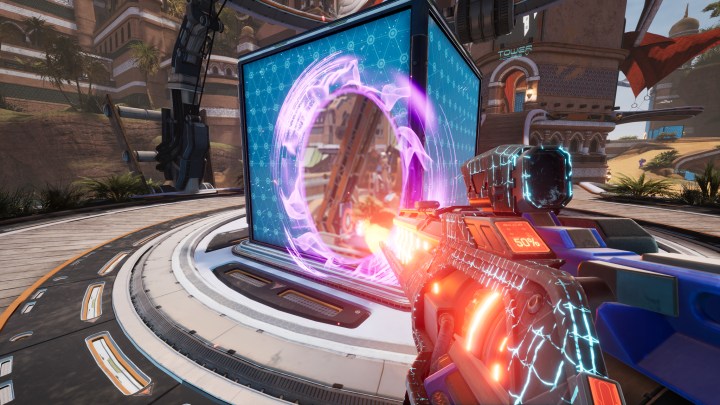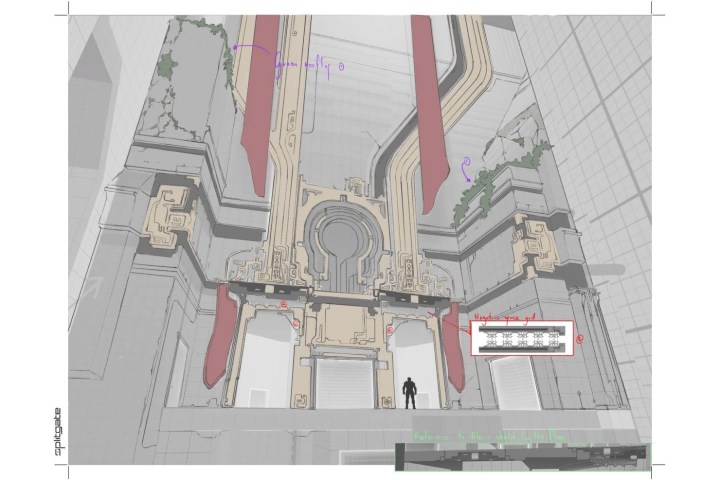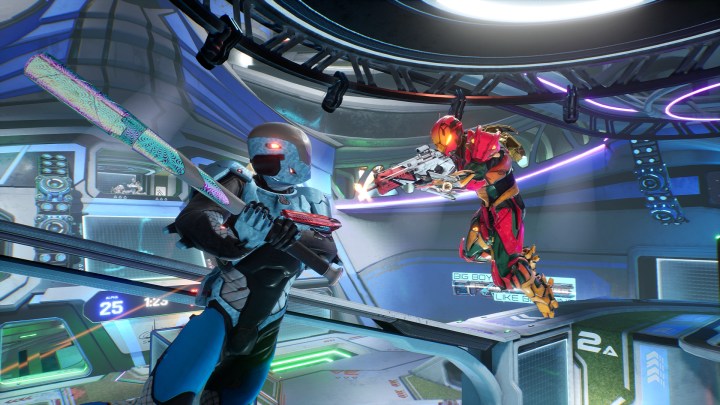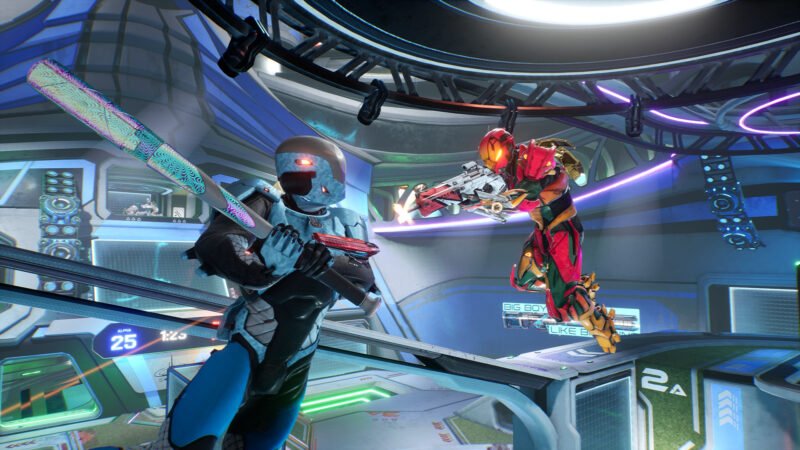In our current age of live service games, it’s not unusual for an online multiplayer to radically evolve through updates. Fortnite, for instance, is a chimera that continues to turn itself inside out every few months. What is unusual, however, is for a game to launch, fail, and completely relaunch as a massive success years later. That’s exactly what happened with Spligate one year ago.
The multiplayer shooter, succinctly described as “Halo meets Portal,” launched to middling reviews and a low player base in 2019. While most studios may have cut their losses and moved on, developer 1047 Games decided to double down. The then-small team would spend two years improving the game and relaunch it in summer 2021, almost branding it as a new game entirely. The commitment paid off, as Splitgate suddenly picked up over 600,000 downloads in its first week and landed on game of the year lists come December.
The gaming landscape has changed in the one year since then. Most notably, Splitgate has gained some competition from the very shooter series it was inspired by: Halo. The development team at 1047 Games doesn’t see that as a problem, though. In an interview with Digital Trends, 1047 CEO Ian Proulx, explains that the secret to Splitgate‘s success has always been the team’s refusal to accept dead ends — a fitting philosophy for a game where you can always portal through any roadblock and keep moving.
Not good enough
Have you ever had an ingenious idea for a game as a kid that you wished you could make? That’s how Splitgate started. Ian Proulx was just a high-schooler when he played Portal 2 and fantasized about the idea of a shooter with portals. Years later, while studying computer science at Stanford University, Proulx would do an independent study for his senior project where he’d learn Unreal Engine 4. And what better way to learn it than to build the game he’d dreamt of all those years ago?
The original prototype for Splitgate was created in three months. It was a rough version of the game that only featured one map and one gun. Initially, the portal gun was an entirely different item that players would need to switch to, but it was quickly changed to an always-equipped tool like it exists now. Proulx quickly learned that the idea had potential.
“I asked seven of my friends who had gaming PCs ‘Can you guys come test this? I need to make sure it works,’” Proulx tells Digital Trends. “Nobody wanted to because we all had finals to study for, but I got them to agree to 45 minutes. And we ended up playing for about five hours straight that day.”
Proulx would eventually return to Standford to get his master’s degree, while developing his Unreal skills. The moment that was done, he hit the ground running, forming 1047 Games with his roommate, Nicholas Bagamian. The 2019 version of Splitgate: Arena Warfare would have a $15,000 budget, all of which came from money the pair had made from summer internships. The first version of the game would launch on May 24, but the duo never expected it to be a hit out the gate.
“The 2019 release was never meant to be this final, worldwide launch,” Proulx says. “We didn’t have the budget for that. It was much more of us taking a mobile gaming or tech startup approach of ‘let’s just get our minimum viable product out there.’ If we have real users playing with our product every day, that’s how we’re going to learn and iterate more officially. And then when it’s good, that’s when we’ll come to console and hopefully blow up — which we ended up doing.”
Having a fun game is not good enough.
Despite the low expectations, the 2019 release was underwhelming. It got a tepid reaction from critics and players didn’t seem interested. Proulx says that he wasn’t fazed at first — in fact, he was encouraged. He saw many of the biggest complaints as solvable problems. The team would spend the next three months fixing player onboarding, adding a tutorial, tweaking matchmaking, and more.
Three months into its life, the game was already in better shape thanks to quick updates. Proulx was sure that its official first season would be enough to turn the tide … but it didn’t. Splitgate was at a crucial crossroads: It either had to get better or the founders would just call it quits.
“The big learning lesson for us was that having a fun game is not good enough,” Proulx says.
Successful relaunch

The 1047 team was committed to making the game work. As long as it was seeing progress and not plateauing, Proulx felt there was no reason to stop. And the studio was seeing the results of that work as the years went on. By 2021, the game’s player retention was three times what it was at launch. The team saw the game’s console launch as a light at the end of the tunnel too. Originally planned for 2020, but internally pushed to 2021, Proulx felt like that could serve as the game’s breakout moment if the team could stay the course long enough.
The gamble paid off when Splitgate relaunched on June 13, 2021. While barely anyone paid the first release any mind, the new version had a breakout moment as it climbed both the Steam and Twitch charts. It was a left-field surprise for people who had written the game off years ago, but it made perfect sense to the team — even if it didn’t anticipate how big the game’s moment would be.
“All those little things add up and we had none of them when we launched in 2019,” Proulx says. “In 2019, we had a fun game that was unique, and we had horrible matchmaking, horrible onboarding, and horrible progression. In 2021, we had a significantly more polished version of that game that was equally fun, but better.”
Proulx believes that part of the game’s success in 2021 came down to timing. At that point, the first-person shooter scene was hungry for something new. Call of Duty players were burning out on Warzone and Halo Infinite still didn’t have a release date after being delayed out of 2020. Splitgate was free-to-play, unique, and fun, so it was in a better position to turn heads.
We need to turn this indie game into a AAA game.
However, it turned a few too many heads. The unexpected success put a wrench in 1047’s plans for the game. The then 20-person team just wasn’t equipped to handle the influx of new players, forcing them to delay the game’s official July 27, 2021, launch indefinitely.
“Our original plan was to launch the beta at the beginning of July, make sure everything’s working, and then launch the final product at the end of July,” Proulx says. “That game plan has changed drastically. Part of it is the servers. We didn’t expect to blow up that quickly. We thought we’d have more time to build out our team. The reality was that we were a team of four engineers, with one-and-a-half on the backend. There was no way we could handle that kind of scale quickly.”
Changing scope

In the wake of the game’s success, 1047 Games would hit some key moments. For one, the team would expand from 20 people to 90. The studio would also receive $100 million in funding, which would completely change not just the scope of the project, but the entire mindset around it.
“Our mentality right now is not operating like a live service product. It’s more operating like ‘we need to turn this indie game into a AAA game,’” Proulx says.
What’s so unusual about Splitgate’s big relaunch year is that players have watched that change happen in real time. In an especially notable move, the team is currently redoing the game’s visuals one piece at a time. New seasons have brought changes to its art direction, but only one map redesign at a time. Proulx says it’s a necessary move now that the team is scaling up; it doesn’t just want to look like Halo-lite.
“Our old content was amazing for what it was,” Proulx says. “But when you look at Splitgate’s older content compared to a game like Halo Infinite or Call of Duty, it doesn’t hold up. We see that in Twitter comments and on Twitch where people say it just looks like a slightly worse version of Halo. That strategy works when you’re an indie team with no budget. You have to cut corners and copy what else is out there because you just don’t have the resources to come up with something unique and new. Now with all the talents we’re hiring, we feel like we can come up with something that hasn’t been done before.”
Halo Infinite is a bit of an elephant in the room during my chat with Proulx. While Splitgate had its moment in the sun during summer 2021, there was a risk that it could all come crashing down at the end of the year when Halo Infinite launched as a free-to-play multiplayer game. Why would players keep playing a small-scale indie inspired by Halo rather than the real thing.
I want to see Halo Infinite do better and succeed.
Proulx wasn’t worried about that. He felt that competition would be good for the game, as it would raise interest in the arena shooter genre while creating a wider narrative. The team embraced the idea of a friendly rivalry — especially as ex-Halo developers actually joined the team.
“We’ve hired a number of people from [developer] 343 recently and there’s definitely a feeling from them about that rivalry,” Proulx laughs. “I don’t personally have that — I’m rooting for them as much as I’m rooting for us. I want to see Halo Infinite do better and succeed. I think it’s better for the genre. But yeah, some people have that rivalry.”
Efficient development
Splitgate would have one key advantage over Halo Infinite in its rival year: a much faster development cycle. Halo Infinite is a huge game with a content road map that’s been set in stone from the beginning. Developer 343 Studios can’t simply bang out new content in a few months, and that’s hurt the game in the long run. Player frustration has grown since its launch as key features like Forge mode keep getting kicked down the line. New modes and maps have been sparse too as the team has wrangling basic quality of life features.
We don’t want to turn into this big AAA machine that can’t move quickly at all …
The development pace couldn’t be more different for Splitgate right now. The nimble development team kicks out features at lightning speed by comparison. The game’s map creator, for instance, was developed and released in three months flat after a quick brainstorm. It’s Juggernaut mode, which launched in June, was thought up in February as an easy project for a newly onboarded developer to create in just a few months.

Proulx believes that the team’s ability to develop reactively, working closely with the community to find new features fans want, is a key part of the game’s success.
“We don’t want to turn into this big AAA machine that can’t move quickly at all because it already has the next two years planned out,” Proulx says. “Everything is built for moving quickly. We don’t want to have a lot of process and red tape and approval. We really want to give power to our employees to move quickly, to operate independently, to have creative freedom. We really try to hire people and get out of their way. If we get to 150 people, but maintain an incredibly high bar of excellence, I think we’ll be able to move faster than anyone out there.”
Proulx says that Splitgate is only ever fully planned out one season in advance, with future seasons only plotted out on a very high level (one bullet point, he says). While the team loves that pace, they’re hoping to get a little bit more organized as the game continues to grow.
Year two
As Splitgate wraps up a banner relaunch year, the team is already looking ahead. It is focused on expanding the game that’s there now rather than rushing toward a sequel. The key comes down to continuing to improve on what’s fun about Splitgate rather than chase industry trends. Proulx notes that 1047 isn’t chasing a metaverse dream or looking to put crypto in the game anytime soon.
The most clear plan right now is that the team wants to expand the game’s story, which is nonexistent at the moment. The studio recently hired a writer who’s currently in exploration mode as Proulx looks to other shooters in the space for inspiration (“I think Apex Legends does it really well.”) While there are no firm plans, Proulx does have a few rules when it comes to expanding the world of Splitgate.
“The only lore I’ve had in mind is that there’s two things Splitgate is,” Proulx says. “Number one, Splitgate is a sport. It’s not a war. We’re not fighting to save the galaxy. And the second thing is that it’s a positive future. I didn’t want it to be a dystopian thing where there are slaves fighting. The world is in a good place!”

It’s an idealistic vision that we don’t usually get from gritty first-person shooters, but it reflects the optimistic spirit that’s helped Splitgate persevere against all odds. From the beginning, Proulx has always been laser focused on what the game can be as opposed to what it’s not. Every obstacle has been a solvable problem. Every off-hand idea is an opportunity to make a more fun game. While 1047 has big plans in mind for Splitgate’s future, it doesn’t plan to lose that energetic streak that’s made the game such a fun one to watch grow.
“Even if we have the next year planned out, realistically I already know that whatever I have planned is probably going to be totally different,” Proulx says.
Editors’ Recommendations
-
Halo Infinite’s co-op test didn’t launch yesterday, but it’s still coming soon -
Overwatch 2: release date, trailers, gameplay, and more -
Mario + Rabbids Sparks of Hope: release date, trailers, gameplay, and more -
The Lord of the Rings: Gollum — release date, trailers, gameplay, and more -
Xenoblade Chronicles 3: Release date, trailers, gameplay, and more








